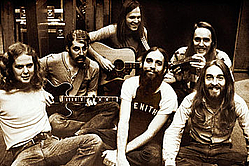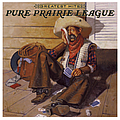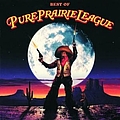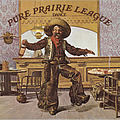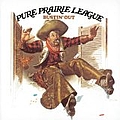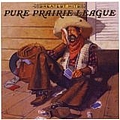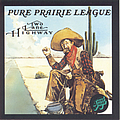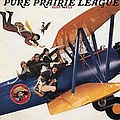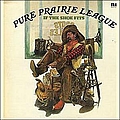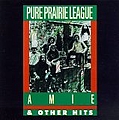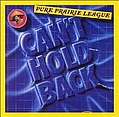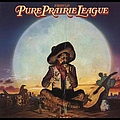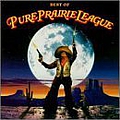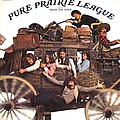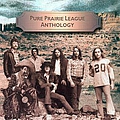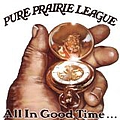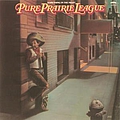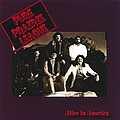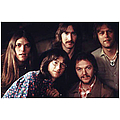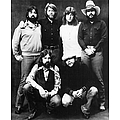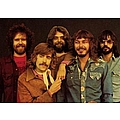Биография Pure Prairie League
Pure Prairie LeagueFrom Wikipedia, the free encyclopedia
Jump to: navigation, search
Pure Prairie League
Pure Prairie League in 2010
Background information
Origin Waverly, Ohio United States
Genres Country rock
Years active 1970–1988, 1998–present
Labels RCA, Casablanca, Thirty Tigers
Associated acts Little Feat, Vince Gill
Website Pure Prairie League Website
Pure Prairie League is an American country-rock band whose roots began between 1964 and 1969 in Waverly, Ohio with Craig Fuller, George Powell, Tom McGrail, Jim Caughlan and John David Call. In 1970 McGrail named the band after a 19th century temperance union mentioned in the 1939 film Dodge City. The band has had a long run, active from the 1970s through the late 1980s and was revived in the late 1990s for a time, then again in 2004
HistoryAlthough the band has its roots in Waverly, Ohio, it was actually formed in Columbus, and had its first success in Cincinnati. Fuller (who would also play with J.D. Blackfoot and Little Feat), McGrail, Caughlan and Call had played together on and off since high school. An early pre-Pure Prairie League recording was a George Ed Powell penned composition, «Break Me Down to Pieces» with Powell (acoustic guitar and vocal), Fuller (lead guitar and vocal), McGrail (drums), Kenny May (bass) and David Workman (pedal steel guitar). In 1970, the first official PPL lineup was Fuller, McGrail, Powell, Phil Stokes on bass, and Robin Suskind on guitar and mandola, with steel guitar player John David Call joining the band later that year. His steel guitar improved the country songs and sparked guitar duels with Fuller that contributed to the country rock signature sound of the band.
Jim Caughlan, who had played drums and guitar with Fuller, Call and McGrail in earlier bands, took over on drums when McGrail quit the band in 1971, just before their first album was recorded. Jim Lanham replaced Stokes who left at the same time. Pure Prairie League was looking for national artist management and they made contact with well-known rock and roll promoter Roger Abramson. Abramson went to New Dilly, a bar in Cincinnati, and immediately signed the band to management. Abramson was able to obtain a recording contract with RCA. Abramson then placed Pure Prairie League as an opening act with many of the concerts that he was producing. Their eponymous first album featured a Norman Rockwell drawing of an old cowboy named Luke, who had originally appeared in Saturday Evening Post magazine. Luke would feature on the cover of every PPL recording thereafter.
After the first album’s release in March 1972 and a nationwide tour, the band decided to relocate to a horse farm in Toronto for the summer of 1972, since Toronto was where the first album had been recorded and Fuller felt safer there since he was facing charges of draft evasion. Call, Caughlan and Lanham were not agreeable to this move and decided to leave. The second album, Bustin Out, was produced, as their debut had been, by Bob Ringe and featured a trio of Fuller, Powell and William Frank (Billy) Hinds (drums, percussion). Hinds’ friend Michael Connor contributed piano to the sessions and would become a regular in the Pure Prairie League line-up for years to come. Mick Ronson, of David Bowie and Mott the Hoople fame, contributed string arrangements on several tracks, most notably «Boulder Skies» and «Call Me Tell Me», and Michael Reilly, who would become the longtime bass player and front man for the band, joined them in early September 1972 after the record’s completion. Bustin Out was released in October 1972.
Shortly afterwards, the group returned to Ohio and Fuller had to face trial in Kentucky. Before conscientious objector (C.O.) status could be arranged, he was sentenced to six months in jail and forced to leave PPL in February 1973. At this point, RCA dropped the band and their future looked bleak.
By August 1973, the band members were in Cincinnati and managed to persuade Call to return. Fuller, though out of prison by now, was working the late shift in a community hospital to satisfy his C.O. requirements and was not inclined to rejoin at this juncture (he was eventually given a full pardon by President Gerald Ford). Reilly took over as the band’s leader and brought in his friend Larry Goshorn (vocals, guitars) to replace Fuller in November 1973. Goshorn had played in a popular Ohio band called Sacred Mushroom.
The band hit the road and began playing gigs constantly, mostly in the Northeast, Midwest and Southeast. As a result of their heavy schedule, particularly at colleges, their songs became well known, with «Amie» (Craig Fuller’s ode to an on-again/off-again relationship), from the second album, becoming a particular favorite.
A Hit At LastAs «Amie» grew in popularity, radio stations began receiving requests for it. As a result, RCA re-released Bustin Out and issued Amie as a single in late 1974. It peaked at #27 in early 1975.
RCA also re-signed PPL and their third album, Two Lane Highway, was released in April 1975, which featured guest appearances by Chet Atkins, fiddler Johnny Gimble, Don Felder from The Eagles and Emmylou Harris, who dueted with the band on the song «Just Can’t Believe It», which received much airplay on country stations. Highway was the band’s highest charter(#24) and Bustin Out reached Gold status, but their subsequent records, If the Shoe Fits, Dance, Live, Takin’ the Stage and Just Fly, sold in lesser quantities.
In 1977, Call left because of increasing back troubles. Larry Goshorn’s brother, Tim, joined in time to record Just Fly. In 1978 there was a mass exodus, as the Goshorns left to form their own group, The Goshorn Brothers, and Powell, the last remaining original member, retired from the road to run his pig farm in Ohio.
The group soldiered on as Reilly quickly brought in temporary members, California country rocker Chris Peterson (vocals, guitar) and the group’s soundman, Jeff Redefer (guitar), to play a few shows until new permanent players could be located.
In September 1978, auditions found Vince Gill (vocals, guitars, mandolin, banjo, fiddle), who had played with the bluegrass outfit Mountain Smoke, as well as Boone Creek(with Ricky Skaggs) and the Sundowners(with Byron Berline). Further auditions brought in LA musician Patrick Bolin(vocals, guitars, flute) in January 1979. This revamped lineup recorded Can’t Hold Back, which turned out to be their last for RCA. Sax player Jeff Kirk accompanied the band on some of the dates of their 1979 tour.
Casablanca Records, who at this time were trying to play down their reputation as a primarily disco label, signed PPL and other non-dance acts to their roster in 1980. In January guitarist Jeff Wilson came in to replace Bolin and the band’s 1980 release Firin’ Up spawned the hits «Let Me Love You Tonight» and «I’m Almost Ready» both sung by Gill, with saxophone accompaniment by David Sanborn. A second Casablanca release, Something in the Night kept PPL in the charts with «Still Right Here in My Heart». But after Casablanca went bankrupt and was completely sold to Polygram Records, Polygram dropped most of Casablanca’s roster, including PPL. Gill left in early 1982 and pursued a hugely successful solo career.
The Later YearsDespite the lack of a recording contract, the group still found itself in demand as a live act and still played at clubs and outdoor fests.
Tim Goshorn returned, Mike Hamilton (vocals, guitars, from Kenny Loggins’ band) also joined in 1982 and was there for 6 months, while Al Garth (vocals, woodwinds, fiddle, keyboards), another Loggins alumnus (Loggins & Messina, also Poco and Nitty Gritty Dirt Band), joined from 1982-1985.
Longtime drummer Billy Hinds retired from the road in 1984 to be succeeded, first by Merle Bregante (also ex-Loggins & Messina and Nitty Gritty Dirt Band), then Joel Rosenblatt (in 1985). Sax player Dan Clawson took over for Garth in 1985, and Gary Burr (vocals, guitars) was there 1984-1985.
1985 also saw the return of PPL co-founder Craig Fuller (who had fronted the groups American Flyer and Fuller/Kaz in the mid-to-late 70s after he’d returned to music). Mementos 1971-1987, released on the small Rushmore label, was recorded back in Ohio, where the band had returned their base, and featured guest appearances from many of the band’s alumni, including Gill, Powell, the Goshorns, Call, Burr and Mike Hamilton. In 1988, the band decided to call it a day. Fuller, who had already joined a reformed Little Feat in 1987, played with PPL for their final shows in the spring of 1988.
RebirthA decade later, PPL was back with a lineup of Fuller, Connor, Reilly, Burr, Fats Kaplin (pedal steel guitar, mandolin, banjo, fiddle, accordion, washboard) and Rick Schell (vocals, drums, percussion). After two years, Burr was succeeded by Curtis Wright (vocals, guitars) in June 2000. The group began work on a new album in 2002, but abandoned the sessions and separated once again after Schell became busy with other projects. Connor died on September 9, 2004 after a long battle with cancer.
Following Connor’s death, the group resumed touring once more in 2004 with Fuller, Reilly, Schell, Wright and Kaplin (when available) and released All in Good Time in 2005, their first album in 18 years. This release appeared on the small Drifter’s Church label.
Since this time, PPL have continued to tour playing a handful of shows every year. Donnie Lee Clark replaced Curtis Wright in 2006 after Wright joined Reba McEntire’s band. Mike Reilly was sidelined in 2006 after he was forced to undergo a liver transplant. Jack Sundrud (from Poco) came in to sub for Reilly, and Rick Plant also did a stint with them on bass briefly before relocating to Australia in late 2006. Jeff «Stick» Davis (from Amazing Rhythm Aces) sat in on bass for Mike in 2007. Reilly appeared at a few shows in May 2007 playing guitar but was unable to come back full-time until 2008. John David Call played some concerts in 2006 & 2007, standing in for Kaplin. In June 2010, Call returned as the pedal steel player full-time.
The band endorses a number of charitable efforts, Pittsburgh’s ongoing BurghSTOCK Concert Series among them.
Discography[edit] AlbumsYear Album Chart Positions
US US Country CAN
1972 Pure Prairie League — — —
Bustin’ Out 34 — 24
1975 Two Lane Highway 24 — 68
1976 If the Shoe Fits 33 — 89
Dance 99 39 —
1977 Takin’ the Stage 68 34 58
1978 Just Fly 79 — 70
1979 Can’t Hold Back 124 — —
1980 Firin’ Up 37 — 78
1981 Something in the Night 72 — —
1987 Mementos — — —
2005 All in Good Time — — —
[edit] SinglesYear Single Peak chart positions Album
US US AC US Country CAN CAN AC
1973 «Amie» 27 — — 40 19 Bustin’ Out
1975 «Two Lane Highway» 97 — — — — Two Lane Highway
1976 «That’ll Be the Day» 106 — 96 — — If the Shoe Fits
1980 «I Can’t Stop the Feelin’» 77 — — — — Firin’ Up
«I’m Almost Ready» 34 10 — — — Firin’ Up
«Let Me Love You Tonight» 10 1 — 14 1
1981 «Still Right Here in My Heart» 28 4 — — — Something in the Night
«You’re Mine Tonight» 68 — — — 21
Тексты популярных песен Pure Prairie League
| Title | |
|---|---|
| 1 | It's All On Me |
| 2 | Place In The Middle |
| 3 | Amie |
| 4 | Angel |
| 5 | Angel No9 |
| 6 | Boulder Skies |
| 7 | Call Me, Tell Me |
| 8 | Dance |
| 9 | Early Morning Riser |
| 10 | Falling in and Out of Love |
Оставить комментарий
Что вы думаете об исполнителе Pure Prairie League? Напишите ваш комментарий.
Альбомы Pure Prairie League
Похожие исполнители
- Poco70s
- The Marshall Tucker Band70s/Rock
- The Ozark Mountain DaredevilsCountry/Rock
- Firefall70s/80s/Rock
- Atlanta Rhythm Section70s/Blues/Rock
- Orleans70s/Pop/Rock
- Seals And CroftsFolk
- Dave Mason70s/Rock
